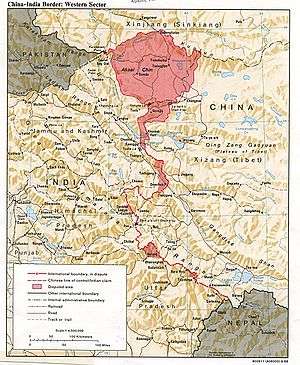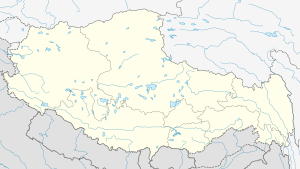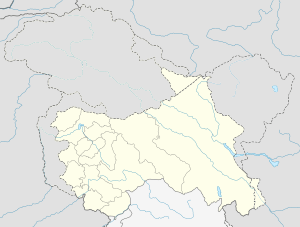Lanak La
| Lanak La | |
|---|---|
 Lanak Pass is on the southeastern boundary of Aksai Chin | |
| Elevation | 5,466 m (17,933 ft) |
| Location | Tibet, China |
| Coordinates | 34°23′38″N 79°32′21″E / 34.3938°N 79.5391°ECoordinates: 34°23′38″N 79°32′21″E / 34.3938°N 79.5391°E |
 Location of Lanak La  Lanak La (Jammu and Kashmir) | |
_(14776461552).jpg)
| Lanak La | |||||||
| Chinese | 拉那克山口 | ||||||
|---|---|---|---|---|---|---|---|
| |||||||
The Lanak La or Lanak Pass (Chinese: 拉那克山口; Hindi: लानक दर्रा) is a mountain pass in Tibet Autonomous Region, China (la means pass in Tibetan and North Indian languages). It is on the southeastern boundary of the Aksai Chin region that is controlled by China.
India regards Lanak La as its boundary with China, while China considers the Kongka Pass further west as the boundary.[1] Lanak La is a well-established frontier point between Ladakh and Tibet confirmed by travellers from William Moorcroft in 1820 onwards.[2] There are substantial Kashmiri Government records for the area of the Chang Chenmo valley between the Lanak and Kongka passes. In addition to the revenue records, 1908 Ladakh Settlement Report, reports of several survey teams, the Jammu and Kashmir Game Preservation Act of 1951, there are Kashmiri documents relating to the construction and maintenance of trade routes, rest houses, and storehouses in the Chang Chenmo valley. All of them placed the entire valley up to the Lanak Pass within Ladakh.[3] Indian sources[4][5] cite travellers in the employment of British India who wrote in the late 19th and early 20th centuries that the traditional boundary between Ladakh and Tibet was at Lanak La.[6][7][8][9][10][11] However, modern scholars such as Larry Wortzel and Allen S. Whiting consider Kongka Pass to be the traditional boundary.[12][13]
Indian sources state that there were no Chinese troops in the area in 1952,[14] that the Indian army patrolled up to Lanak La until 1958,[5] and there was an Indian flag planted there until 1956.[15][16]
In October 1959, Indian troops crossed the Kongka Pass in an attempt to establish posts on Lanak La.[1] This resulted in a clash with the Chinese soldiers posted at Kongka.[1]
References
- 1 2 3 Maxwell, Neville (1970). India's China War. New York: Pantheon. p. 13. Retrieved 29 August 2013.
- ↑ Richardson, H. E. (1962). A Short History of Tibet. E. P. Dutton. p. 225 – via Questia. (Subscription required (help)).
- ↑ Fisher, Margaret W.; Rose, Leo E.; Huttenback, Robert A. (1963). Himalayan Battleground: Sino-Indian Rivalry in Ladakh. Praeger. p. 112 – via Questia. (Subscription required (help)).
- ↑ "Report of the Officials of the Governments of India and the People's Republic of China on the Boundary Question - Part 2" (PDF). Ministry of External Affairs, India, 1961. Archived from the original (PDF) on 21 September 2013. Retrieved 30 August 2013.
- 1 2 Verma, Virendra Sahai (2006). "Sino-Indian Border Dispute At Aksai Chin - A Middle Path For Resolution" (PDF). Journal of development alternatives and area studies. 25 (3): 6–8. ISSN 1651-9728. Retrieved 30 August 2013.
- ↑ Wellby, M.S. (1898). Through Unknown Tibet. Lippincott. p. 78. ISBN 9788120610583.
- ↑ Carey, A. D. (1887). "A Journey round Chinese Turkistan and along the Northern frontier of Tibet". Proceedings of the Royal Geographic Society. 9. JSTOR 1801130.
- ↑ Bower, Hamilton, Diary of A Journey across Tibet, London, 1894
- ↑ Rawling, C. G., The Great Plateau Being An Account Of Exploration In Central Tibet, 1903, And Of The Gartok Expedition 1904-1905, p 38, London, 1905
- ↑ Deasy, H. H. P. (Aug 1900). "Journeys in Central Asia". The Geographical Journal. 6 (2): 142. JSTOR 1774554.
- ↑ Bruce, C. D. (Jun 1907). "A Journey across Asia from Leh to Peking". The Geographical Journal. 29 (6): 600. doi:10.2307/1776269. JSTOR 1776269.
- ↑ Wortzel, Larry (2003). Burkitt, Laurie; Scobell, Andrew; Wortzel, Larry, eds. The Lessons of History: The Chinese People's Liberation Army at 75 (PDF). Strategic Studies Institute, U.S. Army War College. p. 331. ISBN 9781428916517.
- ↑ Whiting, Allen S. (1987). "The Sino-Soviet Split". In MacFarquhar, Roderick; Fairbank, John K. The Cambridge History of China, Volume 14. Cambridge University Press. p. 512. ISBN 978-0-521-24336-0.
- ↑ Vivek Ahuja. "Unforgiveable Mistakes, The Kongka-La Incident, 21st October 1959" (PDF). Retrieved 2011-11-02.
- ↑ Hudson, Geoffrey Francis (1963). Far Eastern Affairs, Volume 3. St. Martin's Press. p. 20.
- ↑ "Notes, Memoranda and letters Exchanged and Agreements signed between The Governments of India and China - White Paper VIII" (PDF). Retrieved 30 August 2013.